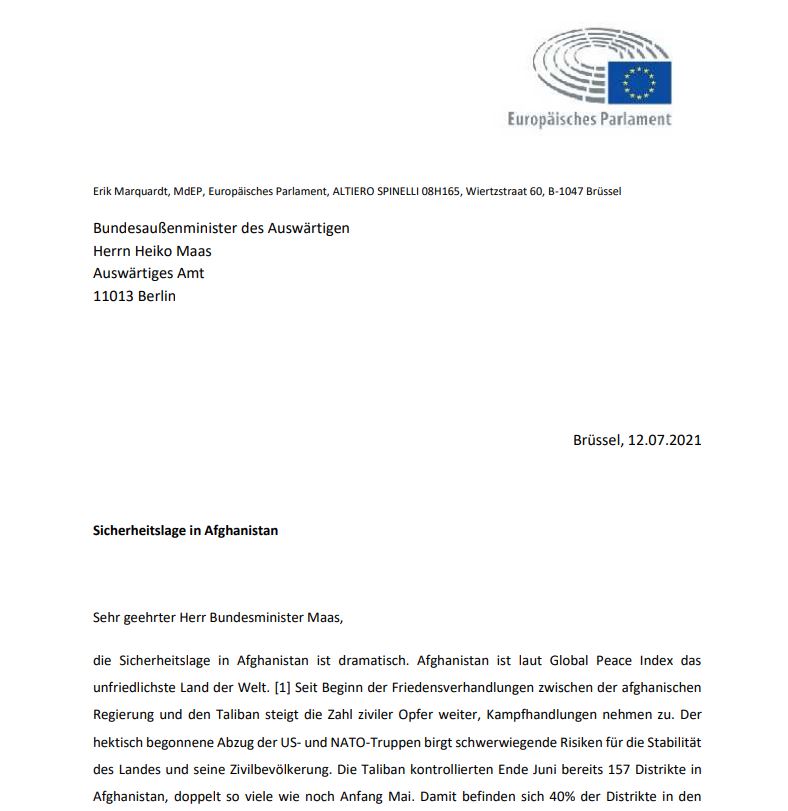Open letter to Heiko Maas on deportations to Afghanistan

The Taliban are conquering more and more territory, people are fleeing and the Afghan government asked for a halt to deportations. I have taken all of these events as an opportunity to a letter to Heiko Maas to write. I would ask him to adjust the assessment of the current security situation in the situation report, irrespective of any domestic political motives and in accordance with new findings and developments.
Dear Federal Minister Maas,
the security situation in Afghanistan is dramatic. According to the Global Peace Index, Afghanistan is the most unpeaceful country in the world. Since the start of the peace negotiations between the Afghan Government and the Taliban, the number of civilian victims has continued to rise and fighting has increased. The hectic withdrawal of US and NATO troops poses serious risks to the stability of the country and its civilian population. At the end of June, the Taliban already controlled 157 districts in Afghanistan, twice as many as at the beginning of May. This means that 40% of districts in the hands of the Talibanjust as many are in contention.
Due to the insecurity, many embassies have already recalled their staff; Australia was the first country to even close its embassy in Kabul. The humanitarian situation in Afghanistan is also worrying. In 2021, about half of the population, 18.4 million people, will be dependent on humanitarian aid; at the beginning of 2020, the figure was still 9.4 million people. Reasons for this are in addition to the ongoing conflict, natural disasters, chronic poverty, food insecurity and, last but not least, the additional burden of the COVID-19 pandemic.
According to a current survey The experiences of Afghans deported from Germany show that they, their relatives and supporters are threatened by violence both by the Taliban and by state actors and their social environment. A large number of the interviewees suffered violence after arriving in Afghanistan due to their previous stay in Europe and the "Westernisation" that went along with it. Securing a livelihood was virtually impossible due to the economic situation and social exclusion, which is why 70% of the interviewees had to leave the country again after a short time. Those who do not have this option are often left with little other way to secure a livelihood than to join warring parties or gangs. Due to the Taliban's control of numerous areas and connecting roads, it is also almost impossible for returnees to reach their provinces of origin.
According to the latest information, an Afghan deported from Germany in February died on 21 June as a result of a grenade. All these findings suggest that the current security situation in Afghanistan and the threat of violence during repatriations make a halt to deportations indispensable. Afghan government also asks for temporary suspension of deportations due to security situation.
Nevertheless, collective deportations from Germany to Afghanistan continue to take place, as was the case most recently on 06.07.2021, They made the following comments in Madrid on 05.07.2021.t: "So far, there has certainly been an increase in violence, which there has also been in the past. If that continues to dramatize, that will also be reflected in our reports." "What impact that will then have on the question of whether people can still be deported to Afghanistan, we will then see. However, with what we have so far in terms of information, I still consider the current practice to be justifiable."
According to the report on the situation in the Islamic Republic of Afghanistan relevant to asylum and deportation (as of June 2020 in the version of 14.01.2021), the Federal Foreign Office is "not aware of any cases in which returnees have demonstrably become victims of acts of violence due to their stay in Europe". Furthermore, some areas in Afghanistan are described as safe, and current developments are not taken into account. The basic comments of the report state that in case of sudden changes in the situation, either an ad-hoc report will be prepared or the recipients will be made aware of the lack of timeliness of the report. It is also pointed out that accurate information from Afghanistan is extremely difficult to obtain. Has such an ad hoc report been produced or, in view of the rapidly changing security situation with far-reaching implications, is it pointed out that the report no longer adequately reflects the current situation? I welcome the fact that the Foreign Office situation report is currently being revised. I would ask you to adjust the assessment of the current security situation in the situation report, irrespective of any domestic political motives and in line with new findings and developments, and to send me the latest report.
With kind regards
Erik Marquardt